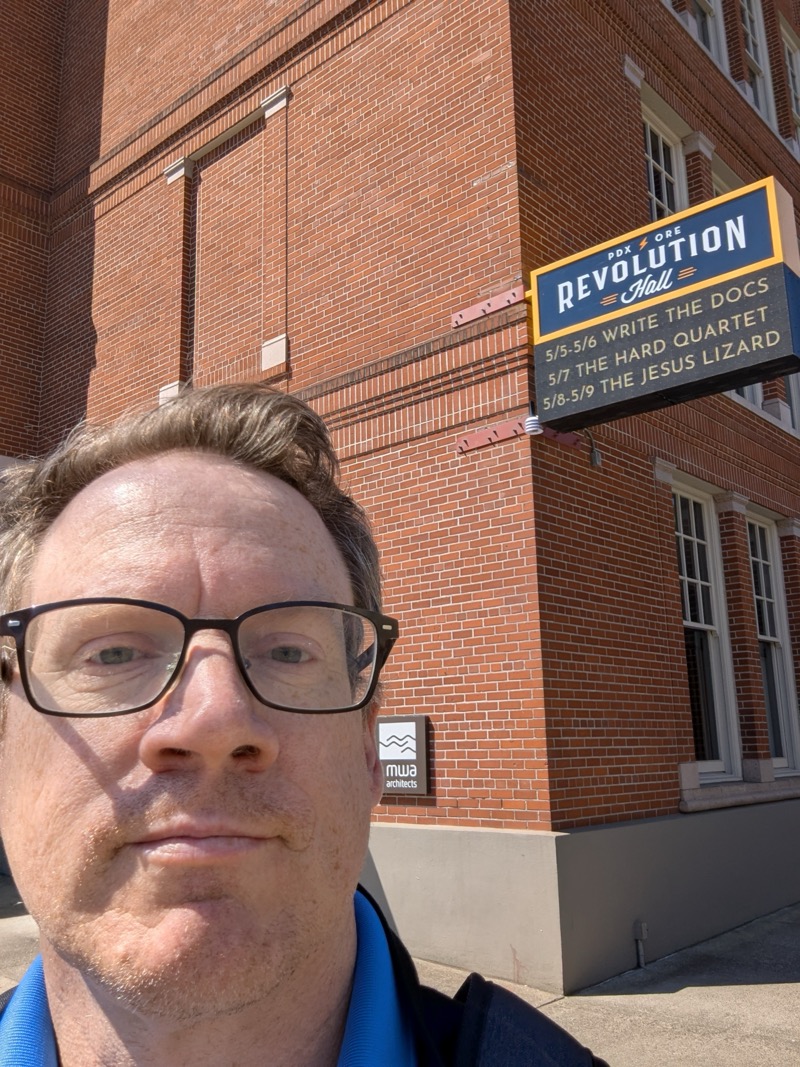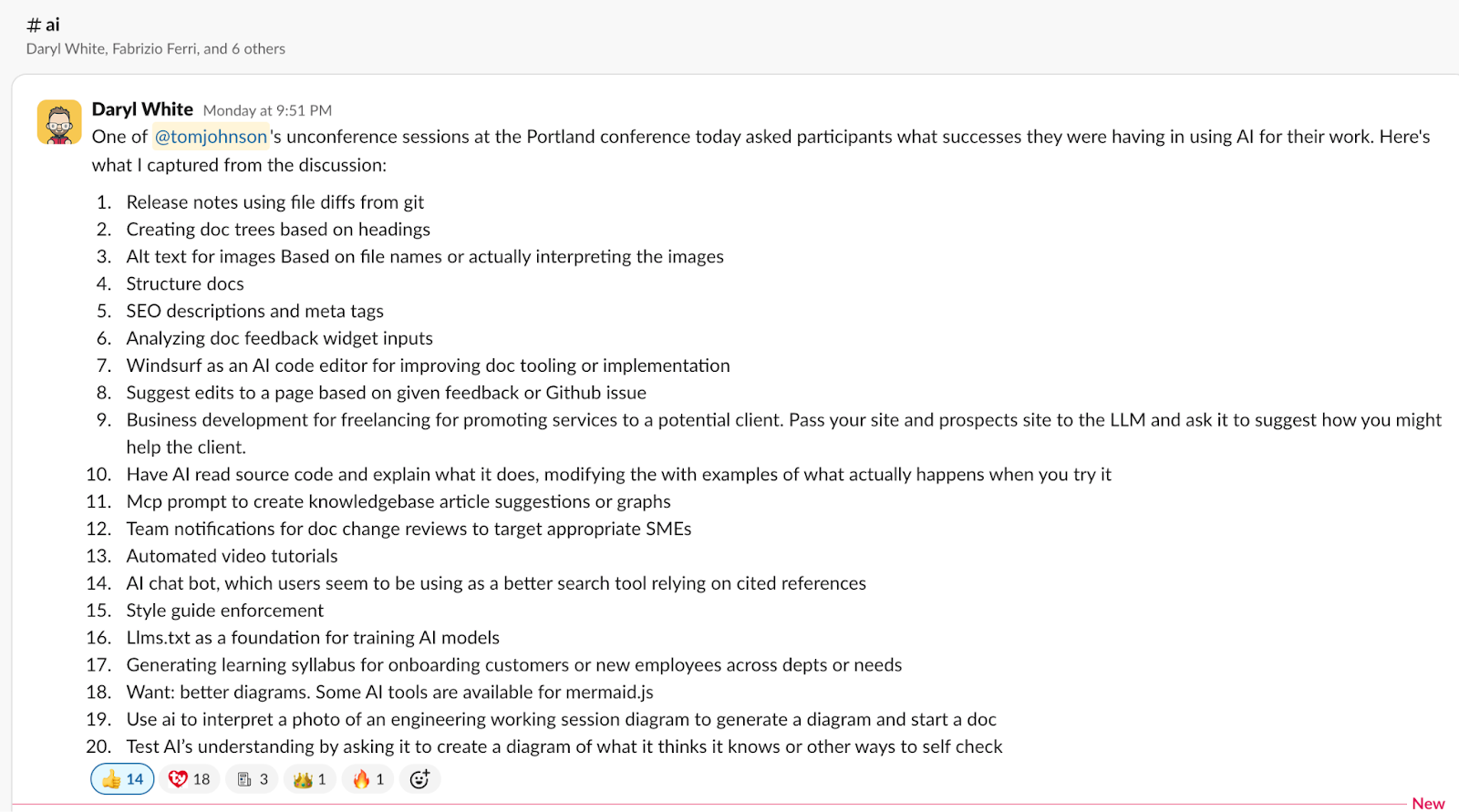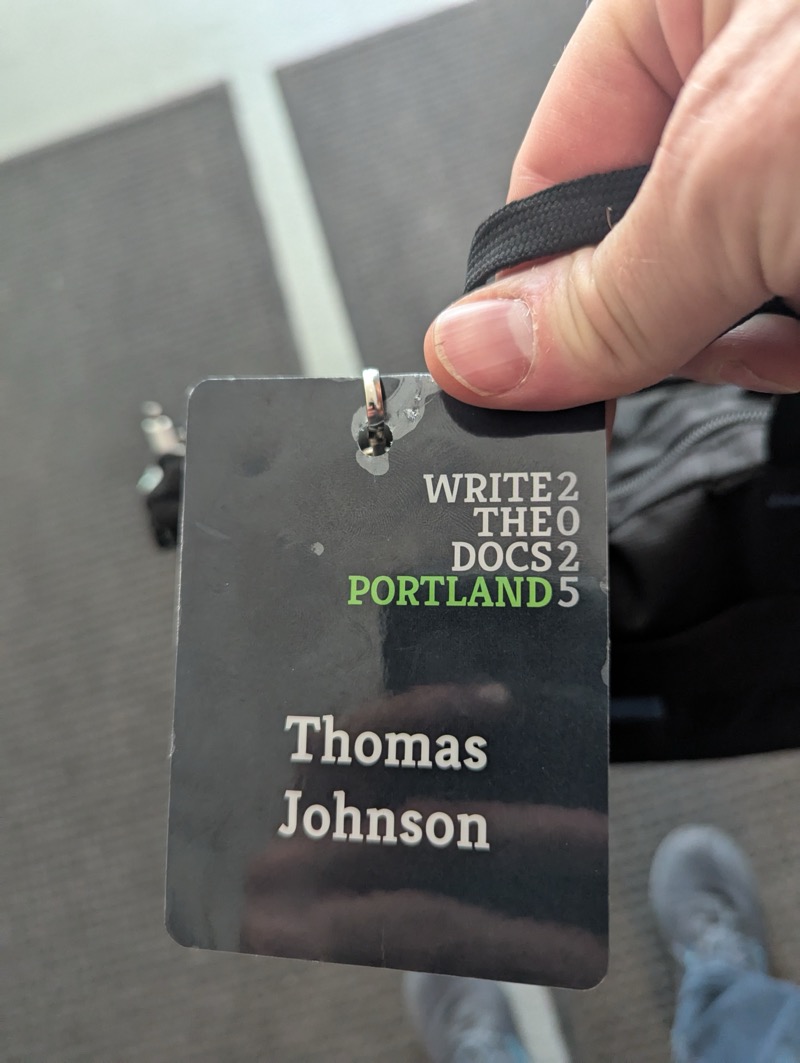Reflections on the WTD Portland 2025 conference
- First in-person conference I’ve attended in years
- The Unconference
- How to lead a good unconference? I have no idea
- Lightning talks
- Conclusion
First in-person conference I’ve attended in years
I recently attended the Write the Docs (WTD) conference, held May 4-6, 2025, in Portland. Although I can hardly believe it, this was the first in-person, external conference I’ve attended since the pandemic. I present regularly at various events, including tech writing conferences at Google, and webinars or virtual sessions at conferences, but I hadn’t been to a real in-person conference (outside of Google or Amazon) for years. It was a last minute decision to go, partly based on feeling an increased sense of isolation in my role and a desire to connect more with the community around me.
 </a>
</a>I didn’t present (which is what I usually do when going to conferences). But I still received a free sponsor ticket because Google was a conference sponsor, though the rest of the travel was out of pocket. I rode the Amtrak down from Seattle (a three-hour ride) and stayed in a nearby Airbnb, a single room in a victorian-style house.
It was great connecting with the tech comm community. I chatted with more people over the course of two days than I’ve spoken with for the past six months. Some presenters were particularly engaging and delivered highly polished, interesting presentations. In particular, I was riveted by two talks:
Alex Garnett, Docs AI Tooling is Better (and Better for Us) than You Think:
Ravind Kumar, Embracing the Kraken : How to build a docs-toolchain monster and why it’s OK
But the others were good as well—for example, Rachel Rigdon’s Quest for the Holy Grail: Turning User Feedback into Meaningful Change and Janine Chan’s Seven habits of increasingly technical technical writers. (You can read the speaker talks and descriptions here. and view the talks on the WTD YouTube channel here).
Honestly, I was blown away by the quality of the presentations. I seemed to remember previous WTD conferences (I’ve been to two total) in which some talks were lightweight and mostly basic common sense. But either I’ve matured or the speaker/presentation quality has gone way up. This year was different.
The Unconference
Before the conference, I was thinking about the unconference sessions, and how I’d been drawn to this format so much in previous years, almost unexpectedly. I remember my first WTD unconference experience: I was fully engaged by the more free-form discussion that I could participate in, steer, and interact with. So on my Amtrak ride down, I had a few unconference topics I was thinking about doing.
In the end, I alternated between the talks and the unconference. If I didn’t perceive a topic to be all that relevant, I’d go to the unconference. And when I wanted a more substantial, less interactive experience, I watched the formal presentations. During the two days, I led three unconference sessions. My pre-session unconference notes on these topics are here (in Google Docs):
- How are you using AI with docs
- AI anxiety: Addressing the most challenging concerns head-on
- The lost art of reading + joining book clubs
One reason I submitted the AI-related unconference topics is because the regular conference program didn’t have many explicit AI topics. In fact, during the opening remarks, Eric, the conference organizer, noted that in choosing the talks, they didn’t want every talk to be about AI. When he said this, a lot of people in the audience cheered. I found this moment supremely interesting. It showed that even before the conference started, there was a palpable sense of AI fatigue—people were tired of hearing AI discussed everywhere. Even one of my colleagues told me that, while she welcomed automation, she also tired of the constant AI discussions. (Every time I brought up AI around her, I had to apologize for doing so.)
The AI fatigue phenomenon confused me. If I had any questions to answer going into the conference, it was to deepen/enrich my understanding of AI and tech comm. Hence the first two unconference sessions I led were explicitly AI-related. And the AI topics seemed to attract a lot of people. For the first session, there were so many people (maybe 40) that we had to go outside near the picnic tables for space. The second likewise had a similar number of people.
For my third topic, however, we had a much cozier number—about a dozen, and we fit seated around a table inside. In short, people weren’t coming to my unconference sessions for me but rather for the AI-themed topics. Thus, there’s a paradox about AI fatigue. Sure, people might be tired of seeing AI themes surfacing everywhere, but people are also hungry for AI knowledge.
How to lead a good unconference? I have no idea
I have mixed feelings about the unconference sessions. First, the conference venue space was challenging for large groups. We fortunately had good weather and could go outside; otherwise, finding space might have required more creativity, as you can’t fit half a dozen groups into one room and hear what anyone is saying without almost shouting. And if you have to speak so loudly to be heard, it’s hard to have a comfortable, easy flowing discussion.
Also, it’s difficult to have a discussion with 40 people. The contributed insights/comments become too fragmented, disjointed, and tangential. There’s not a clear enough through-line to a larger arc or message. This was partly my fault. I should have played a stronger role facilitating a more guided discussion. I’m coming to realize that guiding a productive unconference session is a lot harder than I realized. You can’t just stoke a discussion and then let everyone have their say. First, half the time you can’t hear what someone is saying, but also, unconference sessions suffer from a kind of information scarcity. Most people attend an unconference session hoping to learn more about the topic, to learn from others. But unless there are more knowledgeable people who can expertly guide, analyze, and pull the others through, it ends up being unfulfilling.
For example, during the “How are you using AI with docs” discussion, all these topics were discussed:

(Thanks Daryl for capturing and sharing these notes!)
It was still a good unconference session. But as you can imagine, with 20 separate points like this, the discussion was kind of all over the place. But that’s how I intended it—I wanted people to share their wins with AI, so that we could all learn what was working well. This wasn’t an unconference for getting into ethics or dilemmas or other AI issues—that’s what my “AI anxieties: addressing the most challenging concerns head-on” session was for. This session was all about techniques that were working for people. Some commenters were pretty experienced with AI—for example, I realized I didn’t know anything about MCP (model context protocol) and that it was a central architecture for connecting your docs with AI tools. But for the most part, I reached the conclusion that in general, most people are just as lost as everyone else when it comes to AI.
During the AI anxieties session (a much more discussion-based session), it was interesting to see what issues surfaced. In the topics mentioned, I was surprised that the ethical issues related to AI, such as copyright/attribution issues or environmental harm, didn’t surface. Instead, most people were concerned about losing their job to AI, and understanding what they might do professionally instead. (In that session, I really emphasized that people listen to their inner signals and only raise those concerns that were true concerns they felt.)
For my last unconference session, on reading books, I realized that many people interpreted this topic as being more lightweight than I intended. I read to learn, but the unconference discussion made me realize that many people read for enjoyment/entertainment. The books in some of their readings were romance or science fiction only. The main conclusion of the group was that people would read more if they enjoyed it more. The idea of learning by reading hard books was downplayed in favor of reading for enjoyment. This wasn’t necessarily a conclusion I anticipated going into the unconference—which is a good thing.
Part of the beauty of the unconference session is that while I had an idea about the topics and direction, based on some points to cover (as you can see from my previous notes docs), you never quite know where the discussion will go. As a discussion facilitator, I had just as much interest in learning from others as they might have hoped from me.
Though often random and unpredictable, the unconference sessions have the intriguing quality of discovery. As a facilitator, you might discover that others think very differently about the topic, and maybe their experiences and ideas can teach you something new about the topic. This is why the unconference sessions are so difficult to guide—because you want to allow for the discovery of new ideas you didn’t hold before, so you have to let go of the reins and hear what people have to say. But you also want to avoid fragmented, disjointed conversations or having conversations dominated by vocal but lightweight thinkers. Learning to look for those unknown unknowns during the unconference sessions seems key for a successful outcome.
Lightning talks
Enough on the unconference. I also gave a 5-minute lightning talk on API quick reference diagrams. (In case you haven’t realized it yet, I like to participate. If I wasn’t speaking formally at the conference, I at least wanted to lead some unconference sessions and give a lightning talk. Because I find it boring to sit there and listen to others all day.)
I underestimated the lightning talk difficulty. I’m used to being next to other speakers who are basically introverted, shy tech writers, but some of the lightning talk presenters were clearly experienced presenters who could maybe excel at improv or theater. One talk I particularly enjoyed was one on Haunted Docs, in which the speaker talked about tech writers following unwritten conventions that don’t make much sense—like their actions are guided by unseen forces, haunted. She even paraphrased Derrida!
I actually have a lot of thoughts about API quick reference diagrams, but I failed to convey the significance of them in a 5-minute talk. These are one of the coolest ways to augment API reference docs, and the fact that you can use AI tools to crunch through an entire reference doc set and create them is staggeringly impressive. I’m planning to give some other talks on this topic at length, so hopefully I’ll be able to expand and deepen my thinking about the topic to provide a better presentation. In hindsight, I realized I prefer longer presentation times. Five minutes is hardly enough time to build up momentum and rhythm. The five-minute duration is a deceptively difficult format to master.
In signing up for the lightning talk, part of me wanted to demo what we can do with AI. We can reinvent reference documentation through AI, for example. AI tools are transformation engines that take an input and transform it into an output based on your instruction. But this point didn’t resonate. My time was up.
You can view my lightning talk here—it’s the last one on Day One in this grouping of five:
Conclusion
I could probably write a dozen posts on different aspects of the conference. Overall, any conference that allows participants to engage as much as they want (leading their own unconference sessions, giving lightning talks, chatting with others during many social events, and interacting with sponsors at booths) is a great formula for a conference. I also like the single track for the presentations, with the presenters on a center stage. I’m not sure why I haven’t been going to WTD every year, but I think I’ll become more of a regular.

About Tom Johnson

I'm an API technical writer based in the Seattle area. On this blog, I write about topics related to technical writing and communication — such as software documentation, API documentation, AI, information architecture, content strategy, writing processes, plain language, tech comm careers, and more. Check out my API documentation course if you're looking for more info about documenting APIs. Or see my posts on AI and AI course section for more on the latest in AI and tech comm.
If you're a technical writer and want to keep on top of the latest trends in the tech comm, be sure to subscribe to email updates below. You can also learn more about me or contact me. Finally, note that the opinions I express on my blog are my own points of view, not that of my employer.




